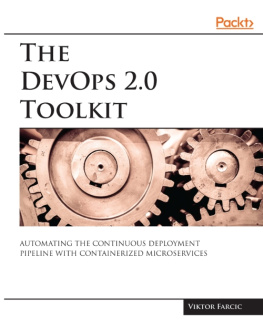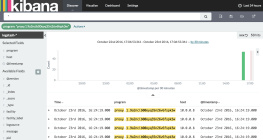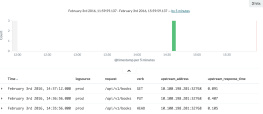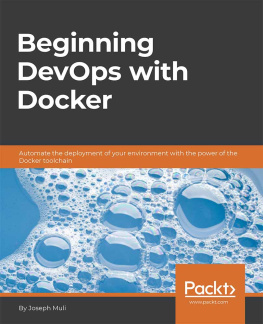Victor Farcic - The DevOps 2.2 Toolkit: Self-Sufficient Docker Clusters
Here you can read online Victor Farcic - The DevOps 2.2 Toolkit: Self-Sufficient Docker Clusters full text of the book (entire story) in english for free. Download pdf and epub, get meaning, cover and reviews about this ebook. year: 2017, publisher: Packt Publishing, genre: Business. Description of the work, (preface) as well as reviews are available. Best literature library LitArk.com created for fans of good reading and offers a wide selection of genres:
Romance novel
Science fiction
Adventure
Detective
Science
History
Home and family
Prose
Art
Politics
Computer
Non-fiction
Religion
Business
Children
Humor
Choose a favorite category and find really read worthwhile books. Enjoy immersion in the world of imagination, feel the emotions of the characters or learn something new for yourself, make an fascinating discovery.

- Book:The DevOps 2.2 Toolkit: Self-Sufficient Docker Clusters
- Author:
- Publisher:Packt Publishing
- Genre:
- Year:2017
- Rating:4 / 5
- Favourites:Add to favourites
- Your mark:
- 80
- 1
- 2
- 3
- 4
- 5
The DevOps 2.2 Toolkit: Self-Sufficient Docker Clusters: summary, description and annotation
We offer to read an annotation, description, summary or preface (depends on what the author of the book "The DevOps 2.2 Toolkit: Self-Sufficient Docker Clusters" wrote himself). If you haven't found the necessary information about the book — write in the comments, we will try to find it.
Victor Farcic: author's other books
Who wrote The DevOps 2.2 Toolkit: Self-Sufficient Docker Clusters? Find out the surname, the name of the author of the book and a list of all author's works by series.
The DevOps 2.2 Toolkit: Self-Sufficient Docker Clusters — read online for free the complete book (whole text) full work
Below is the text of the book, divided by pages. System saving the place of the last page read, allows you to conveniently read the book "The DevOps 2.2 Toolkit: Self-Sufficient Docker Clusters" online for free, without having to search again every time where you left off. Put a bookmark, and you can go to the page where you finished reading at any time.
Font size:
Interval:
Bookmark:
This book is for sale at http://leanpub.com/the-devops-2-2-toolkit
This version was published on 2017-11-07

* * * * *
This is a Leanpub book. Leanpub empowers authors and publishers with the Lean Publishing process. Lean Publishing is the act of publishing an in-progress ebook using lightweight tools and many iterations to get reader feedback, pivot until you have the right book and build traction once you do.
* * * * *
It seems that with each new book the scope gets fuzzier and less precise. When I started writing Test-Driven Java Development the scope of the whole book was done in advance. I had a team working with me. We defined the index and a short description of each chapter. From there on we worked on a schedule as most technical authors do. Then I started writing the second book. The scope was more obscure. I wanted to write about DevOps practices and processes and had only a very broad idea what will be the outcome. I knew that Docker had to be there. I knew that configuration management is a must. Microservices, centralized logging, and a few other practices and tools that I used in my projects were part of the initial scope. For that book I had no one behind me. There was no team but me, a lot of pizzas, an unknown number of cans of Red Bull, and many sleepless nights. The result is The DevOps 2.0 Toolkit: Automating the Continuous Deployment Pipeline with Containerized Microservices. With the third book, the initial scope became even more obscure. I started writing without a plan. It was supposed to be about cluster management. After a couple of months of work, I attended DockerCon in Seattle where we were presented with the new Docker Swarm Mode. My immediate reaction was to throw everything I wrote to trash and start over. I did not know what will the book be about except that it must be something about Docker Swarm. I was impressed with the new design. Something about Swarm ended up being The DevOps 2.1 Toolkit: Docker Swarm: Building, testing, deploying, and monitoring services inside Docker Swarm clusters. While working on it, I decided to make DevOps Toolkit Series. I thought that it would be great to record my experiences from different experiments, and from working with various companies and open source projects. So, naturally, I started thinking and planning the third installment in the series; The DevOps Toolkit 2.2. The only problem is that, this time, I truly dont have a clue what will it be about. One idea was to do a deep comparison of different schedulers (e.g. Docker Swarm, Kubernetes, and Mesos/Maraton). The another was to explore serverless. Even though it is a terrible name (there are servers, we just dont manage them), it is a great subject. The ideas kept coming but there was no clear winner. So, I decided not to define the scope. Instead, I defined some general objectives.
The goals I set in front of me is to build a self-adaptive and self-healing system based on Docker. The only problem is that I do not yet know how I will do that. There are different bits of practices and tools Ive been using, but there is no clearly visible light at the end of the tunnel. Instead of defining what the book will be, I defined what I want to accomplish. You can think of this book as my recording of the journey. I will need to explore a lot. I will probably need to adopt some new tools and write some code myself. I dont know, yet. Maybe it will turn out to be something completely different, and there will not be a self-adaptive and self-healing system. Well see. Think of this book as Viktors diary while trying to do stuff.
So, for now, the objectives are to go beyond a simple setup of a cluster, services, continuous deployment, and all the other things you probably already know. If you dont, read my older books. I do not yet know the scope, nor I know what will be the result. Typically, when you write a book, you start with an outline and an index, write your chapters one by one and, at the end of the process, write a preface. It makes us (authors) look intelligent and in control. That is not the case. I did not write the preface at the end of the process (as an editor would advise me). Im trying to be honest with you. I dont have a plan.
Youve been warned! I dont know where this book is going nor whether I will manage to fulfill my self-defined objectives. Ill do my best to outline the steps towards a self-adapting and self-healing system in the same way as I am exploring them myself.
This book will not teach you DevOps practices. It will not show you how Docker works. It will not explore how to build images, deploy services, operate Swarm clusters, nor how to do continuous deployment. We will not develop microservices nor will we go through practices and tools that allow us to create and manage our infrastructure. This book assumes that you already know all that. If you do not, please read The DevOps 2.0 Toolkit: Automating the Continuous Deployment Pipeline with Containerized Microservices for a general overview of DevOps tools and practices and The DevOps 2.1 Toolkit: Docker Swarm: Building, testing, deploying, and monitoring services inside Docker Swarm clusters for an in depth examination of how Docker Swarm clusters work.
Now that you know what this book is NOT about, you are probably wondering what it is. Well I dont know yet. I decided to skip the planning and just start coding and writing about solutions that go beyond a simple cluster management and deployment of services. The objective is to create a self-adapting and self-healing system. Thats all I know for now. Im not sure how I will do it nor whether I will succeed. What I do know is that I will write down every step of the journey.
While there will be a lot of theory, this is a hands-on book. You wont be able to complete it by reading it in a metro on the way to work. Youll have to read this book while in front of a computer getting your hands dirty. Eventually, you might get stuck and in need of help. Or you might want to write a review or comment on the books content. Please join the DevOps20 Slack channel and post your thoughts, ask questions, or simply participate in a discussion. If you prefer a more one-on-one communication, you can use Slack to send me a private message or send an email to viktor@farcic.com. All the books I wrote are very dear to me, and I want you to have a good experience reading them. Part of that experience is the option to reach out to me. Dont be shy.
Please note that this, just as the previous book, is self-published. I believe that having no intermediaries between the writer and the reader is the best way to go. It allows me to write faster, update the book more frequently, and have a more direct communication with you. Your feedback is part of the process. No matter whether you purchased the book while only a few or all chapters were written, the idea is that it will never be truly finished. As time passes, it will require updates so that it is aligned with the change in technology or processes. When possible, I will try to keep it up to date and release updates whenever that makes sense. Eventually, things might change so much that updates are not a good option anymore, and that will be a sign that a whole new book is required. I will keep writing as long as I continue getting your support.
Font size:
Interval:
Bookmark:
Similar books «The DevOps 2.2 Toolkit: Self-Sufficient Docker Clusters»
Look at similar books to The DevOps 2.2 Toolkit: Self-Sufficient Docker Clusters. We have selected literature similar in name and meaning in the hope of providing readers with more options to find new, interesting, not yet read works.
Discussion, reviews of the book The DevOps 2.2 Toolkit: Self-Sufficient Docker Clusters and just readers' own opinions. Leave your comments, write what you think about the work, its meaning or the main characters. Specify what exactly you liked and what you didn't like, and why you think so.




